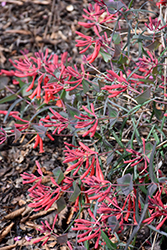It's all about ...
plants

Leo Trumpet Honeysuckle
Lonicera sempervirens 'Leo'
Height: 20 feet
Spread: 24 inches
Sunlight:
![]()
![]()
Hardiness Zone: 4a
Other Names: Coral Honeysuckle
Description:
A stunning vine featuring showy bright red tubular flowers with yellow throats all season long; a free flowering selection that is easy to grow; flowers best in full sun; ideal for covering an arbor, fence or trellis
Ornamental Features
Leo Trumpet Honeysuckle features showy clusters of scarlet trumpet-shaped flowers with yellow throats at the ends of the branches from early summer to mid fall. It features an abundance of magnificent red berries from mid to late fall. It has bluish-green deciduous foliage which emerges burgundy in spring. The oval leaves do not develop any appreciable fall colour.
Landscape Attributes
Leo Trumpet Honeysuckle is a multi-stemmed deciduous woody vine with a twining and trailing habit of growth. Its average texture blends into the landscape, but can be balanced by one or two finer or coarser trees or shrubs for an effective composition.
This woody vine will require occasional maintenance and upkeep, and is best pruned in late winter once the threat of extreme cold has passed. It is a good choice for attracting butterflies and hummingbirds to your yard, but is not particularly attractive to deer who tend to leave it alone in favor of tastier treats. It has no significant negative characteristics.
Leo Trumpet Honeysuckle is recommended for the following landscape applications;
- Hedges/Screening
- General Garden Use
Planting & Growing
Leo Trumpet Honeysuckle will grow to be about 20 feet tall at maturity, with a spread of 24 inches. As a climbing vine, it tends to be leggy near the base and should be underplanted with low-growing facer plants. It should be planted near a fence, trellis or other landscape structure where it can be trained to grow upwards on it, or allowed to trail off a retaining wall or slope. It grows at a fast rate, and under ideal conditions can be expected to live for approximately 20 years.
This woody vine does best in full sun to partial shade. It does best in average to evenly moist conditions, but will not tolerate standing water. This plant should not require much in the way of fertilizing once established, although it may appreciate a shot of general-purpose fertilizer from time to time early in the growing season. It is not particular as to soil type or pH, and is able to handle environmental salt. It is somewhat tolerant of urban pollution. Consider applying a thick mulch around the root zone in winter to protect it in exposed locations or colder microclimates. This is a selection of a native North American species.
This plant is not reliably hardy in our region, and certain restrictions may apply; contact the store for more information.
